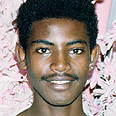
Gabriel Dwait
צילום: יונת אטלס
Who cares about Ethiopians
Story behind Hizbullah swap attests to shameful attitude towards Ethiopians
The government of Israel and us, the journalists, owe one family from Be'er Sheva an apology: The family of Gabi Ababao Dwait, whose body was returned to Israel from Lebanon Monday. We must apologize for this story hitting us out of the blue; for the fact the Israeli public, which has the right to know, knew nothing about the guy who disappeared about three years ago; the guy who moved here from Ethiopia in 1981 and attempted to build a life for himself; The guy whose family failed to elicit the help of the police during the years of his disappearance; the guy whose photo was never published in the media.
There are still many unknown facts in this painful story, about a guy who went to the Haifa shore, while carrying his passport, seven days after his brother died. Even after the body was returned, the circumstances are still a mystery – maybe he committed suicide; maybe he drowned; maybe he attempted to travel to another land in order to escape Israeli reality, and who knows why or how he died.
The Dwait family is a typical Ethiopian family whose world collapsed. The family was hit by one tragedy after another: A father who was run over by a car; a brother who committed suicide. For three years now, the family has been engaged in a search for the lost son. The son who nobody heard about, saw, or cared about. He just disappeared. Evaporated.
Just like any of us would do under such circumstances, they turned to the authorities, to the Israel Police. Yet the answer they received at the police stations in Haifa and Be'er Sheva was always the same: "He's a big boy, he'll return home." Just like that. Just another Ethiopian guy wandering around – as if all members of the Ethiopian community are destined to wander forever.
Sense of ostracism and Isolation
Imagine that Gabi Dwait's name was in fact Danny Gutshtein; imagine his family was Israeli-born and that his parents had connections in the right places – what would the last three years look like? Wide-scale searches, photos in the media, interviews with leading journalists?Yet this didn't happen for the kid whose family characterized a "good guy." A kid who never had trouble with the law, served in the army, and just wanted to mourn his brother and return to Be'er Sheva. Yet something happened on the way.
There is a ray of light in this story. Just like me, relatives and community members are hoping that their personal tragedy would give rise to something good for abducted IDF soldiers Eldad Regev, Ehud Goldwasser, and their families. If this happens, Dwait's relatives would feel that they contributed again, in their silent and painful way, to the national effort.
Maybe some good will also come out of the fact that Gabriel Dwait's tragedy finally exposed the humiliating attitude of the establishment, media, and Israel Police to members of the Ethiopian community.
Yet the anger and frustration, and the sense of ostracism and isolation, will continue to resonate through the souls of community members. After all, this sad story attests to, more than anything, the personal, mental, and physical isolation faced by Ethiopian community members; the ghettos we live in. After all, our preferred entertainment venue is the Tel Aviv central bus station vicinity, among the foreign workers and prostitutes. That's our place because they don't let us in to other places. We're excluded because of the color of our skin.
Yet this story also says something about you, members of the establishment, the media, and Israeli society; for you, looking for a missing Ethiopian is just not "In" – it's just not worth the effort.
Therefore, Gabi Dwait's story is also the story of the absurdity of our life.










